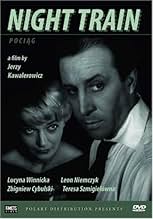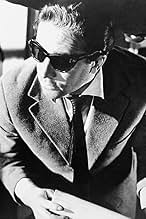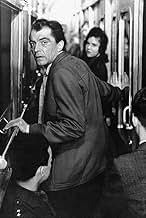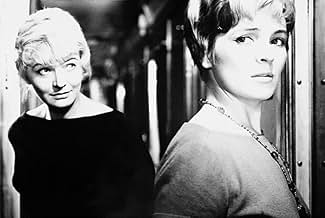NOTE IMDb
7,7/10
3,9 k
MA NOTE
Ajouter une intrigue dans votre langueJerzy enters a train set for the Baltic coast. He seems to be on the run from something, as does the strange woman with whom he must share a sleeping compartment.Jerzy enters a train set for the Baltic coast. He seems to be on the run from something, as does the strange woman with whom he must share a sleeping compartment.Jerzy enters a train set for the Baltic coast. He seems to be on the run from something, as does the strange woman with whom he must share a sleeping compartment.
- Réalisation
- Scénario
- Casting principal
- Récompenses
- 2 victoires et 1 nomination au total
Andrzej Herder
- Sailor
- (non crédité)
Barbara Horawianka
- Jerzy's Wife
- (non crédité)
Avis à la une
A man named Jerzy (Leon Niemczyk) is taking a Night Train along the Baltic coast, he wears dark sunglasses and by his body language we can tell he wants to be alone and to this end, he books a sleeping compartment all to himself, .But on entering his compartment he finds a young blonde woman named Marta (Lucyna Winnicka) occupying it, she refuses to leave even when the train inspector is called, but when the inspector threatens her with the police, Jerzy says forget about it and he lets her stay, suspicious behaviour as the very overcrowded train is awash with talk of the local murderer who is on the run from the police, Marta also seems to have something to hide and is being chased by a young suitor travelling in standard classic, in a train full of different character, could the killer be on board?Jerzy calls a truce with Marta and soon their conversation begins to open up, a bond gradually grows between the two but is interrupted when the police hunting for the killer, board the train in a remote area and immediately arrest Jerzy, can he prove his innocence on the remaining journey? Jerzy Kawalerowicz perhaps best known as the director of the superb tale of possession, Matka Joanna od aniolów (1961) here produces a Hitchcockian type thriller set on a train with equally successful results. Set to a jazzy score Andrzej Trzaskowski, which adds immensely to the atmosphere while also perfectly suiting the motion of the train, we are gradually introduced to many of the different characters on board, a large group on a pilgrimage, the desperately flirtatious wife of a Polish solicitor, intent on getting some attention from whoever will listen, the young priest travelling with his elderly Monsiegnor, we even get to know the train staff intimately. Jan Laskowski's cinematography is beautiful and captures the claustrophobia of the overcrowded train, but yet still retains a sense of movement in a confined space. The killer being chased at dawn across cold open fields by all on board is a highlight, it finishes with the killer's capture in a rundown graveyard. The films ending is quite apt and somewhat downbeat as all the travellers return to their own lives at their destination, after the excitement of the previous night.
Night Train is the first film I've seen from highly rated Polish director Jerzy Kawalerowicz and it's a highly impressive film too! The film takes on a Hitchcockian style, although Kawalerowicz' directorial style is more sombre than Hitchcock's and the film straddles the line between thriller/mystery and drama excellently. As the title suggests, the film is set aboard a train, and the director really makes good use of this setting as the claustrophobia of the vehicle is constantly imposed, and other elements such as the chance of meeting strangers on a train and the idea of a lot of different people being together in one place also come into play. The film focuses on Jerzy; a mysterious man who boards a train on course for the Baltic coast. It soon becomes apparent that the man has a high need for privacy, and this is disrupted by Martha, a woman who he finds in his compartment. At first he seems keen to get rid of her, but later reluctantly agrees to let her stay. It later transpires that the police are on the hunt for a man who murdered hid wife...and Jerzy finds himself under suspicion.
The film is stylishly shot and Kawalerowicz' style reminded me somewhat of the "Nouvelle Vogue" style that was popular in France around the early sixties. The black and white picture helps to impose a dark atmosphere on the film and this in turn helps to build the mystery surrounding the central character. The characters themselves are all interesting and the way that the director feeds us more information about each one as the film progresses is well done and helps to keep the audience interested in the film. The acting courtesy of Leon Niemczyk and Lucyna Winnicka in the central roles is excellent and both performers give their characters plenty of credibility. The murderer plot often feels like something of a spare wheel to the other things going on in the film, but I think this was intended as by not putting the full focus on this plot, more time is given to developing the characters. The results of this plot are stunning, however, and the sequence that finally sees the murderer chased down is well shot and highly memorable. As the film winds down, Jerzy Kawalerowicz gives us an interesting take on the twist ending and this helps to separate Night Train further from the majority of other thrillers. Overall, this is a fascinating little thriller and comes highly recommended!
The film is stylishly shot and Kawalerowicz' style reminded me somewhat of the "Nouvelle Vogue" style that was popular in France around the early sixties. The black and white picture helps to impose a dark atmosphere on the film and this in turn helps to build the mystery surrounding the central character. The characters themselves are all interesting and the way that the director feeds us more information about each one as the film progresses is well done and helps to keep the audience interested in the film. The acting courtesy of Leon Niemczyk and Lucyna Winnicka in the central roles is excellent and both performers give their characters plenty of credibility. The murderer plot often feels like something of a spare wheel to the other things going on in the film, but I think this was intended as by not putting the full focus on this plot, more time is given to developing the characters. The results of this plot are stunning, however, and the sequence that finally sees the murderer chased down is well shot and highly memorable. As the film winds down, Jerzy Kawalerowicz gives us an interesting take on the twist ending and this helps to separate Night Train further from the majority of other thrillers. Overall, this is a fascinating little thriller and comes highly recommended!
It is marvellous that this magnificent Polish classic has been made available in 2011 in a restored version on DVD with English subtitles. The film, in crisp black and white with extremely creative camera work, is a joy to watch. In many ways it resembles the Western noir films of the late forties and early fifties, but it has psychological depth and is not just a thriller. In many ways it reminds me of a high-quality noir such as Nicholas Ray's IN A LONELY PLACE (1950, see my review), where loneliness and tragic encounters are really the main theme. That film's theme was 'I loved you for a few weeks', but in this film the love lasts for but a day. NIGHT TRAIN (POCIAG in Polish, which merely means 'train', though in an earlier release for the cinema, the film was known in English as BALTIC EXPRESS) takes place mostly on a train, and train films are always such a great favourite, being a perfect metaphor of life. This aspect is intensively stressed by the director, with his shots of the many separate carriages and compartments, both full and later empty. The moving shots up and down the crowded corridors seem to be a miracle of planning, and give every appearance of having been shot on a real moving train. But some of it was done in a studio with removable walls, to enable this seemingly impossible camera movement to take place. The camera never stops, it roams restlessly like a wild beast through this moving Noah's ark of humanity, seething as it is with mystery, fear, an escaping murderer, a woman with murder in her heart, a despairing wife trapped in a hopeless marriage, and even a survivor of Buchenwald who cannot sleep in a bunk because it reminds him of the concentration camp, so that he spends all his time in the corridor reading, until he drops off. They are all supposed to be going off on holiday to the seaside, a town called Hel. The dramas meanwhile are swirling round everyone as they tensely smoke their cigarettes and fret about the dangers of a killer in their midst, and make furtive assignations. The train stops at night at a place where it has never stopped before, and three policemen get on, in search of the man who has just murdered his wife. Which of the mysterious men on the train is really the murderer? The astonishing scene where the murderer leaps from the moving train and all the men go after him in a mob scene and trap him in a ramshackle cemetery is meant to be a metaphor for the seamy side of Poland's recent history. The Polish government had banned jazz music until the reforms of 1956, so this film has a defiantly jazz soundtrack all the way throughout, though soft, dreamy, and haunting. The atmosphere of the film is electric but also mesmerizing. There are long periods of brooding and contemplation, and many characters barely speak, while others chatter uncontrollably. The focus of the film is on the mysterious blonde beauty, played by Lucyna Winnicka, who says little, and after this film was shot, married the director. She conveys so much by her eyes and expressions and moods that there is little need for dialogue. The film was directed by Jerzy Kawalerowicz (1922-2007), who made 17 films between 1952 and 2001, of which this, PHARAOH (1966), QUO VADIS? (2001), and MOTHER JOAN OF THE ANGELS (1961) are the most famous. In NIGHT TRAIN, he shows himself to be a master of the cinematic craft. The film is continuously absorbing, thoughtful but paced, and deeply intriguing. Like life, it does not answer all of its mysteries, and happiness remains elusive. One of the most frustrated and disappointed of the characters is played by the famous actor, Zybigniew Cybulski, as an eager young man who simply cannot comprehend his rejection by Winnicka, or even begin to understand her new and impenetrable air of gloom and inevitable fate. When fate takes an unexpected turn, the defeat of inevitability itself has the taste of exchanging one emptiness for another. Empty compartments, empty lives; a speeding train, life's hurtling express in which we all are carried. This is one of the finest of the many 'train films'.
You know from the first minute that this is a different kind of train thriller. The first shots are in the station, lots of people bustling about, but instead of "busy" music on the soundtrack, the music here is slow, and it is cool jazz. This sets up the detached tone from the beginning. Some of the characters are nervous, even hysterical, but the director keeps everything at arm's length.
The story is very simple: A man on the train is fleeing after killing his wife. It is not known whether he is alone or with a woman. The movie concentrates on two couples, a single woman, and a single man. The three women move between the men--are they ordinary women looking for companionship, or is one of them trying to help, or escape from, the killer?
The scene in which the murderer is caught will recall the same scene in M and, of course, since the movie is Polish, the hunting down of fleeing, terrified people which so recently happened on Polish soil. The photography, excellent throughout, is especially beautiful and powerful in this scene. The director makes us aware of the symbolism, but not in an obtrusive way. The man who picks up the Cross and what he does with it quietly makes the point that the murderer and his pursuers are not different in kind, only in degree.
The story is very simple: A man on the train is fleeing after killing his wife. It is not known whether he is alone or with a woman. The movie concentrates on two couples, a single woman, and a single man. The three women move between the men--are they ordinary women looking for companionship, or is one of them trying to help, or escape from, the killer?
The scene in which the murderer is caught will recall the same scene in M and, of course, since the movie is Polish, the hunting down of fleeing, terrified people which so recently happened on Polish soil. The photography, excellent throughout, is especially beautiful and powerful in this scene. The director makes us aware of the symbolism, but not in an obtrusive way. The man who picks up the Cross and what he does with it quietly makes the point that the murderer and his pursuers are not different in kind, only in degree.
10gombro
The film beautifully depicts the reality of trains, possibly not only those running in Poland but also all over the world. The claustrophobic atmosphere of the train brings people together and lets the viewers plunge into the story and its rhythm. Beautiful black and white pictures and melancholic jazz theme bring to mind other films form the era. What makes the film even more attractive is the final turning point and sudden change in the behavior of the passengers. The only regretful fact is that such intimate,subtle films are not made anymore. Great pity.If it was made in English by lets say Orson Welles it would have been a cult movie for sure all over the world just as it is in Poland.
Le saviez-vous
- AnecdotesStaszek, the young man following Marta, is seen several times getting on the train after it has started moving. The inspector warns him a couple of times that it is dangerous. Zbigniew Cybulski who plays Staszek died a few years later, aged 39, after falling under a moving train he was attempting to board at Wroclaw Glowny railway station in Poland.
- ConnexionsFeatured in Fejezetek a film történetéböl: A lengyel film (1990)
Meilleurs choix
Connectez-vous pour évaluer et suivre la liste de favoris afin de recevoir des recommandations personnalisées
- How long is Night Train?Alimenté par Alexa
Détails
- Durée
- 1h 39min(99 min)
- Couleur
- Mixage
- Rapport de forme
- 1.37 : 1
Contribuer à cette page
Suggérer une modification ou ajouter du contenu manquant


































